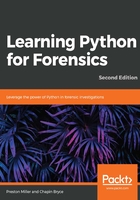
Libraries
Libraries, or modules, expedite the development process, making it easier to focus on the intended purpose of our script rather than developing everything from scratch. External libraries can save large amounts of developing time and, if we're being honest, they are often more accurate and efficient than any code we, as developers, can cobble together during investigations. There are two categories of libraries: standard and third-party. Standard libraries are distributed with every installation of Python and carry commonly used code that's supported by the Python Software Foundation. The number and names of the standard libraries vary between Python versions, especially as you move between Python 2 and Python 3. We will do our best to call out when a library is imported or used differently between Python 2 and 3. In the other category, third-party libraries introduce new code, add or improve functionality to the standard Python installation, and allow for the community to contribute modules.